One myth about WikiLeaks is that it favors U.S. enemies and declines to publish documents against them, while another legend is that WikiLeaks, for obscure reasons, is soft on Israel, reports Patrick Lawrence.
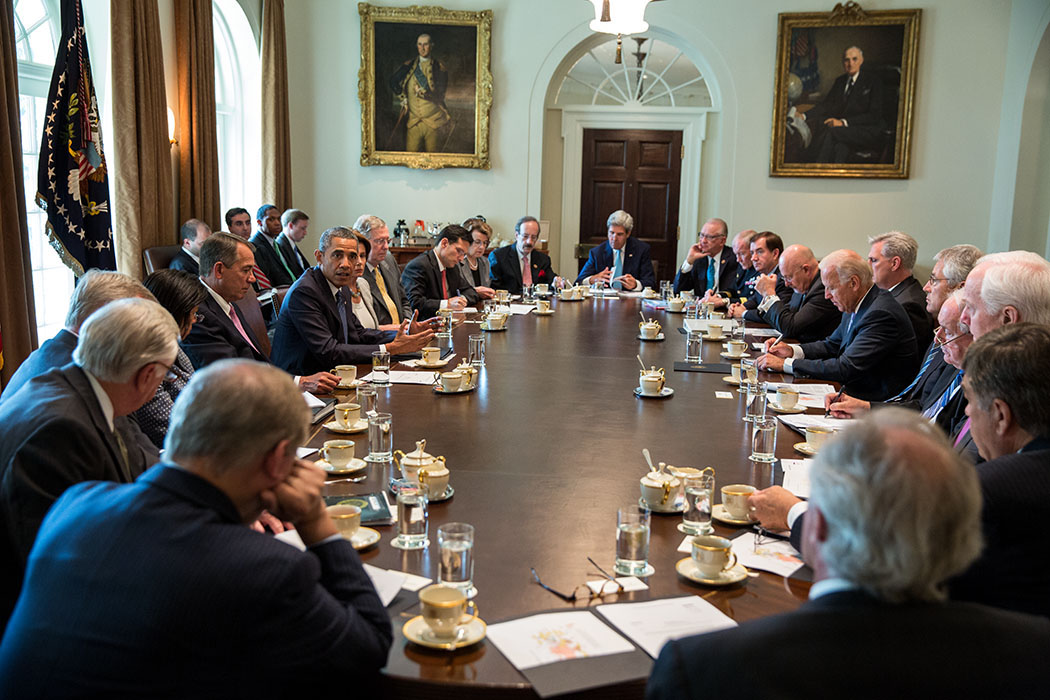
President Barack Obama meets with members of Congress to discuss Syria in the Cabinet Room of the White House, Sept. 3, 2013. (White House, Pete Souza)
By Patrick Lawrence
Special to Consortium News
 As WikiLeaks continued its document releases, and as major news organizations continued to publish fulsome accounts and analyses of these releases, the media’s stance toward Julian Assange and his organization began to turn: What had begun as collegial collaboration was transformed into criticism and denigration — this in accordance with the hardening attitudes of the U.S. and allied governments.
As WikiLeaks continued its document releases, and as major news organizations continued to publish fulsome accounts and analyses of these releases, the media’s stance toward Julian Assange and his organization began to turn: What had begun as collegial collaboration was transformed into criticism and denigration — this in accordance with the hardening attitudes of the U.S. and allied governments.
The key events in this shift were WikiLeaks’ publication in October 2010 of “Iraq War Logs,” comprised of 392,000 Army field reports, and, a month later, the phased publication of “Cablegate,” a collection of 251,287 State Department emails. “Cablegate” was the first major release of U.S. diplomatic traffic in WikiLeaks’ “Public Library of U.S. Diplomacy.” At writing, this continually expanding collection makes available more than 3 million documents spanning the 1966–2010 period.
With these publications, along with “Collateral Murder” and “Afghan War Diary,” released earlier in 2010, WikiLeaks penetrated more deeply into the citadels of official secrecy than it had since its founding in 2006. This new reality stunned the Obama administration and the national-security apparatus invisibly but formidably behind it.
Official policy shifted. Washington began actively to pursue avenues through which Assange could be arrested, charged, and tried for one or another offense, however far-fetched, trivial, or unrelated to WikiLeaks’ work. It was at this time that Sweden alleged that Assange had raped two women during a visit to Stockholm for a media conference—allegations based on falsified police reports and concocted evidence.
The media’s treatment of WikiLeaks and Julian Assange faithfully reflected Washington’s newly activated hostility toward both. Myths arose; fallacies were disseminated as self-evident truths. One of these held that WikiLeaks favored America’s enemies — or those Washington deemed enemies — and declined to publish documents pertaining to them. High on this list were Russia and Syria.
Another myth had it that WikiLeaks, for obscure reasons, was soft on Israel, the record supposedly showing it had never published documents reflecting unfavorably on the Middle East’s apartheid state.
On April 13, 2017, shortly after President Donald Trump named him director of the CIA, Mike Pompeo addressed the Center for Strategic and International Studies, the Washington think tank. Pompeo devoted a remarkable proportion of his speech to WikiLeaks and Julian Assange. This reflects the timing of Pompeo’s C.S.I.S. presentation.
Less than a year earlier WikiLeaks had begun publishing mail stolen from the Democratic National Committee’s computer servers. By the time Pompeo spoke, the convoluted, devoid-of-evidence conspiracy theory we call “Russiagate” was fixed in the American consciousness.
Pompeo’s Ire, Clinton Liar?
What had surely incensed Pompeo as CIA director was WikiLeaks’ release from March to September 2017 of Vault 7, described by The New York Times as “catastrophic” for the agency as the “largest” leak in its history.
“It is time to call out WikiLeaks for what it really is — a non-state hostile intelligence service often abetted by state actors like Russia,” Pompeo asserted. The press and broadcasters turned these remarks into headlines, and another groundless fabrication was on its way to being accepted as fact.
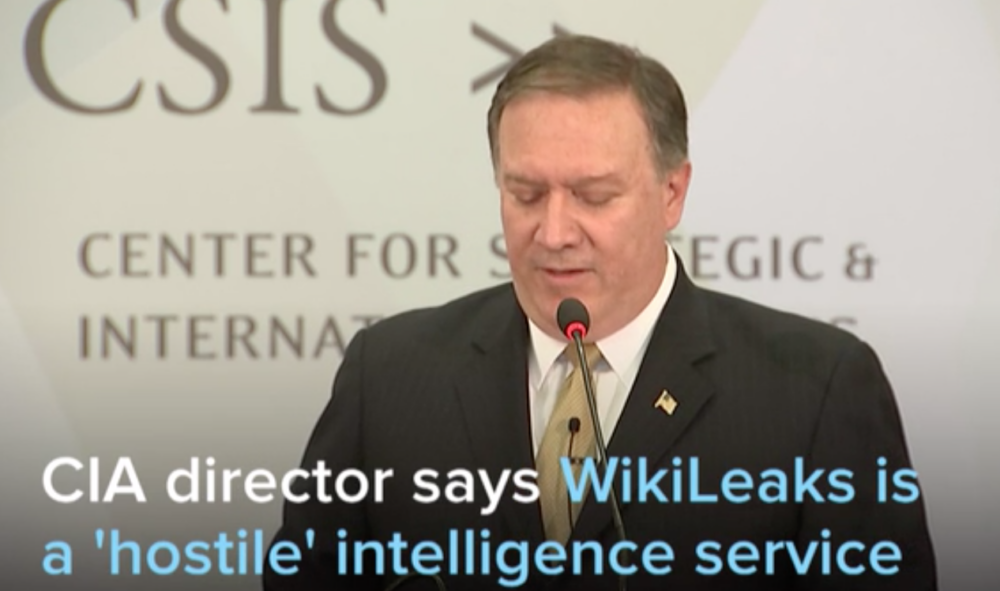 Not only had Russians given Wikileaks the emails they had supposedly pilfered from the Democratic Party apparatus; more than this, Wikileaks’ founder was “an agent of the Kremlin,” they said. The conjured connection was key. It licensed the press to abandon Assange entirely, so finishing what it had begun in late 2010.
Not only had Russians given Wikileaks the emails they had supposedly pilfered from the Democratic Party apparatus; more than this, Wikileaks’ founder was “an agent of the Kremlin,” they said. The conjured connection was key. It licensed the press to abandon Assange entirely, so finishing what it had begun in late 2010.
Six months after Pompeo’s speech, Hillary Clinton asserted in an October 2017 interview with the Australian Broadcasting Corporation that Assange had never published documents on Russia. “If he’s such a martyr for free speech, why doesn’t WikiLeaks ever published anything coming out of Russia?” the recently defeated Democratic candidate asked. “You don’t see damaging, negative information coming out about the Kremlin on WikiLeaks.”
At the time Clinton spoke, WikiLeaks had already released more than 1 million files on the Russian Federation. It’s possible Clinton didn’t know, but probably should have when she was secretary of state.
Similar assertions concerning WikiLeaks’ treatment of Syria and Israel had already appeared by autumn 2017, suggesting alleged biases at the publication were to become a new theme in the press. In December 2010, Haaretz published a report describing allegations that Assange had entered a secret agreement with Israel not to publish documents damaging to Israeli interests.
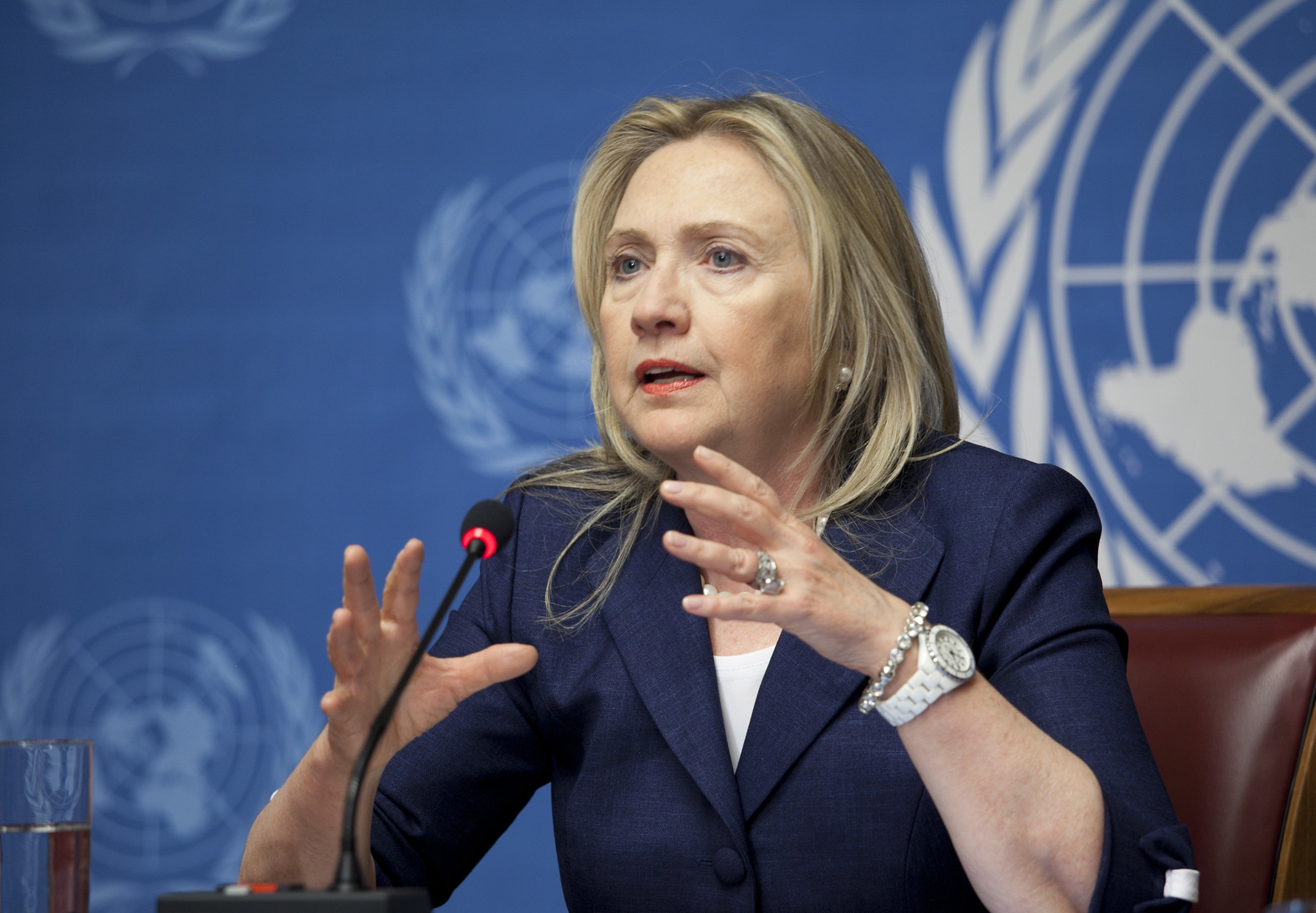
Clinton addresses media at the United Nations Office at Geneva following the June 30, 2012 meeting of the Action Group for Syria. (US Mission Geneva)
The liberal Israeli daily cited bloggers and “disgruntled Wikileaks volunteers” as quoted in an Arabic-language online publication. Al Haqiqa, the Arabic magazine, asserted that Assange had removed or destroyed documents related to Israel’s 2006 and 2008–09 attacks on Gaza.
As in the case of Russia, WikiLeaks’ available record on Syria and Israel was air-brushed out of the picture in both cases. The Gaza invasions figure prominently in the Israel-related documents examined here.
Consortium News examined the Russia case last autumn as part of this ongoing series. In this installment of “The Revelations of WikiLeaks” CN explores its releases on Israel and Syria. WikiLeaks has published extensive and often revealing diplomatic traffic between the U.S. and Israel covering the years 2007 to 2015.
WikiLeaks and Israel
The WikiLeaks releases of diplomatic cables related to Israel cover a nine-year period, 2007–15, and derive primarily from traffic between Washington and the U.S. Embassy in Tel Aviv. These cables, and in key cases email messages, are now part of the Public Library of U.S. Diplomacy. They reveal a consistent pattern in U.S.–Israeli diplomatic relations: Accommodation and acquiescence to Israeli preferences and intentions are the default American position, even when Israel is in contravention of international law or humanitarian norms.
At issue during the years spanned in the cables were Israel’s political and military strategies in the West Bank and Gaza, the Israeli–Palestinian peace process, and the nature of Iran’s nuclear programs.
Even when Israeli officials advise American diplomats that they intended to use force against Palestinian civilians, or sabotage the Gaza and West Bank economies, the U.S. response in the cables is never more than timid criticism. Altogether, the WikiLeaks releases make plain the extraordinary extent of Israel’s influence over American officials and legislators and their collusion as Israel continually resorts to violence against Palestinians.

Protest against Israel’s Gaza Blockade and attack on humanitarian flotilla, Melbourne, Australia, June 5, 2010. (Takver via flickr)
A December 2009 cable from the Tel Aviv embassy, marked secret, followed by a few months Israel’s extremely violent invasion of Gaza in 2008–09. It recounts an extensive Israeli briefing of a U.S. congressional delegation, in which an Israeli general declares Israeli Defense Forces’ plans to attack urban areas in “the next battle,” ignoring restrictions against attacks targeting civilians.
After border skirmishes in 2010 and 2011, the I.D.F mounted a series of violent attacks in Gaza in 2012. A full-scale war ensued in 2014. The 50–day campaign took the lives of at least 1,500 civilians, according to the U.N.’s office of humanitarian affairs.

Destroyed ambulance in Shuja’iyya in the Gaza Strip after Israeli bombardment, Aug. 6, 2014. (Wikimedia Commons/Boris Niehaus (www.1just.de)
As described in the cable, the briefing also covered U.S.–Israeli cooperation on missile defense, cyber warfare, and the Iran question. Lt. General Gabi Ashkenazi also took the occasion to thank the House Armed Services Committee for its support of the Israeli cause. Committee Chairman Ike Skelton, a Missouri Democrat, was part of the delegation. This cable can be found here.
Many cables reveal Israel’s calculations vis-à-vis the relative strengths of the Palestinian Authority, Fatah (the largest party in the Palestine Liberation Organization), and Hamas, which governed in Gaza since it won Palestinian legislative elections in 2006. Several cables dated 2007 report that Benjamin Netanyahu and Tzipi Livni, opposition leader and foreign minister respectively at this time, are dismissive of the Palestinian Authority as ineffectual even as Israel was negotiating with it. They instead urged Washington to bring down the Hamas government by way of an “economic squeeze.”
Here is an extract from a lengthy cable sent from the embassy in Tel Aviv on November 3, 2008. It went to the secretary of state (Condoleeza Rice at the time), the Treasury Department, the American Embassy in Cairo, and unnamed American officials in Jerusalem. The cable is marked “Secret” and is not signed.
It explains Israel’s strategy of sabotaging the Gazan economy to undermine Hamas’s authority and describes Israel’s refusal to guarantee mandated monthly transfers of Palestinian funds to the Palestinian Authority—in effect treating liquidity as a security matter and a means to exert control over the Palestinian government in Ramallah, at this time Israel’s partner in negotiations for an Israeli–Palestinian settlement:
The cable went on to report that Israel intended Gaza to receive “just enough money for the basic needs of the population but is not interested in returning the Gazan economy to state of normal commerce and business.” It urged Washington to “persuade” Israel to abandon this policy—which amounted to collective punishment, a crime under the Geneva Conventions—but this was pro forma given the entrenched, uncritical support Israel enjoys on Capitol Hill and in successive administrations. The policy remains in place unchanged.
In another cable, dating to mid–February 2010, the embassy reports on the I.D.F.’s plans to respond with force to demonstrations then widespread on the West Bank. It notes the impatience of Israeli officers with nonviolent protesters. While the cable’s origin in the embassy is not noted, it is signed “Cunningham.” The reference to “dirty water” refers to a chemical solution duplicating skunk spray that the I.D.F. uses against protesters. Hillary Clinton was secretary of state at this time:
The cable goes on to note that nonviolence “stymies the I.D.F.,” quoting a Defense Ministry official saying, “We don’t do Gandhi very well.” It also mentions the arrest of foreign NGO workers for participating in demonstrations and that Israel had stopped issuing visas to “the foreign staff of NGOs working in the occupied territories” after restricting their activities for several months.
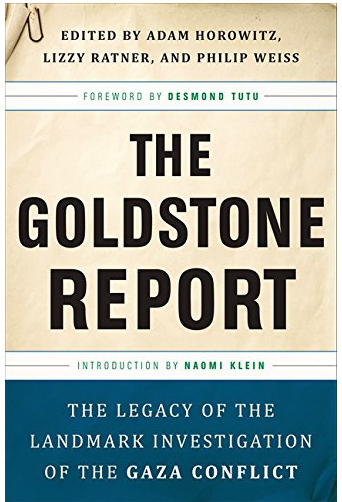 A number of WikiLeaks releases reveal the efforts of Susan Rice, during her 2009–13 tenure as ambassador to the U.N., to protect Israel from a U.N. investigation of war crimes committed during the 2008–09 Gaza invasion. That investigation led to “The Goldstone Report,” which, when issued in September 2009, concluded that the I.D.F. (and some Palestinian militants) were guilty of war crimes and possibly crimes against humanity.
A number of WikiLeaks releases reveal the efforts of Susan Rice, during her 2009–13 tenure as ambassador to the U.N., to protect Israel from a U.N. investigation of war crimes committed during the 2008–09 Gaza invasion. That investigation led to “The Goldstone Report,” which, when issued in September 2009, concluded that the I.D.F. (and some Palestinian militants) were guilty of war crimes and possibly crimes against humanity.
Colum Lynch, a writer at Foreign Policy, covered the Rice cables in an April 11, 2018, report titled “Special Relationship.” In it he also revealed Rice’s warning to Song Sang-hyun, then president of the International Criminal Court, against investigating alleged Israeli war crimes. Lynch wrote:
“‘How the I.C.C. handles issues concerning the Goldstone Report will be perceived by many in the U.S. as a test for the I.C.C., as this is a very sensitive matter,’” she [Rice] told him, according to a Nov. 3, 2009, cable from the U.S. Mission to the United Nations.”
Iran, its nuclear programs, and its regional relationships were issues of considerable concern for the U.S. and Israel during the period covered in the WikiLeaks releases. In 2015 WikiLeaks published a 2012 email on these topics sent to Hillary Clinton, at this time secretary of state. It was written by James Rubin, an assistant secretary of state in the Clinton administration. It is especially revealing and reads in part:
“UNCLASSIFIED U.S. Department of State Case No. F-2014-20439 Doc No. C05794498 Date: 11/30/2015 RELEASE IN FULL
The best way to help Israel deal with Iran’s growing nuclear capability is to help the people of Syria overthrow the regime of Bashar Assad. Negotiations to limit Iran’s nuclear program will not solve Israel’s security dilemma. Nor will they stop Iran from improving the crucial part of any nuclear weapons program — the capability to enrich uranium…. At best, the talks between the world’s major powers and Iran that began in Istanbul this April and will continue in Baghdad in May will enable Israel to postpone by a few months a decision whether to launch an attack on Iran that could provoke a major Mideast war.
Iran’s nuclear program and Syria’s civil war may seem unconnected, but they are. For Israeli leaders, the real threat from a nuclear-armed Iran is not the prospect of an insane Iranian leader launching an unprovoked Iranian nuclear attack on Israel that would lead to the annihilation of both countries. What Israeli military leaders really worry about — but cannot talk about — is losing their nuclear monopoly. An Iranian nuclear weapons capability would not only end that nuclear monopoly but could also prompt other adversaries, like Saudi Arabia and Egypt, to go nuclear as well. The result would be a precarious nuclear balance in which Israel could not respond to provocations with conventional military strikes on Syria and Lebanon, as it can today….”
The WikiLeaks archive indicates that Clinton forwarded this email to an assistant with a request he print it, with the intention of “trying to urge the President and his political advisers to act.” John Kerry replaced Clinton as secretary of state in early–2013; negotiations with Iran on its nuclear programs began soon thereafter.
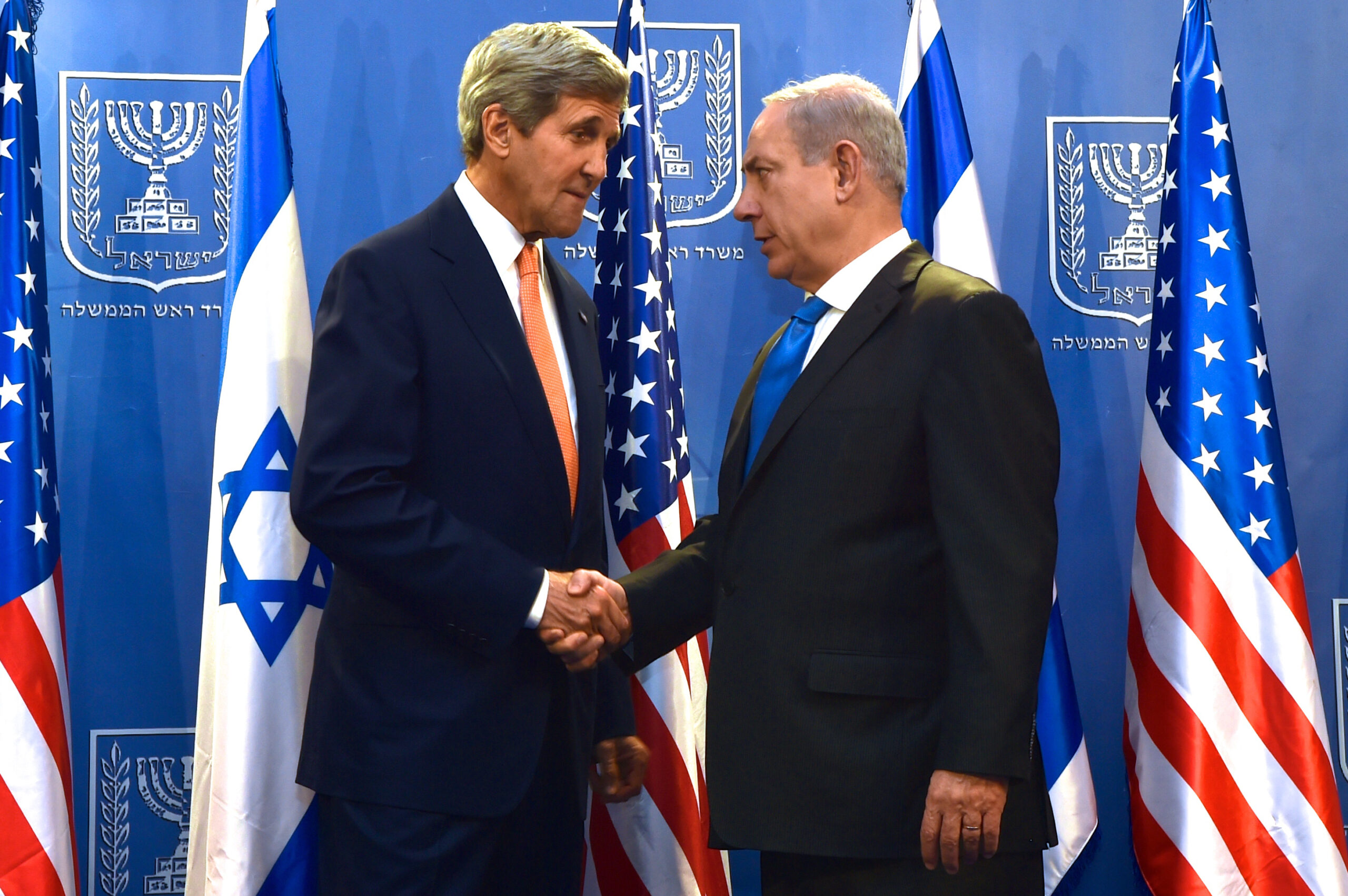
U.S. Secretary of State John Kerry and Benjamin Netanyahu, Tel Aviv, 23 July 2014. (U.S. Department of State, Flickr)
Other Clinton-related email messages reveal her deceptive way of managing her “unconditional” support for Israel during her 2015–16 presidential campaign. In one, campaign manager Robby Mook, concerned about anti–Israeli activists, counsels that Clinton “shouldn’t have Israel at public events.”
In another, Dan Schwerin, a speechwriter, proposes writing a campaign-trail speech that does not mention Israel. “Then she can drop in Israel when she’s with donors,” Schwerin explains. This email thread, which derives from “The Podesta Emails,” a 2016 WikiLeaks release, can be found here .
‘Syria Files’

Syrian Army soldier at checkpoint outside of Damascus shortly after the outbreak of internal conflict, 2012. (Elizabeth Arrott, VOA News, Wikimedia Commons)
WikiLeaks began releasing “Syria Files,” a trove of more than 2.4 million email messages obtained in 2012 from the Damascus government’s computer servers and from those transacting with it.
The releases began in batches on July 6, 2012. They were comprised of 2.43 million emails downloaded from 680 separate domains used by the Syrian government, including the ministries of presidential affairs, foreign affairs, finance, information, transport, and culture. The email traffic of assorted political figures, including President Bashar Assad and his wife, Asma al–Assad, as well as a variety of foreign companies, was also exposed.
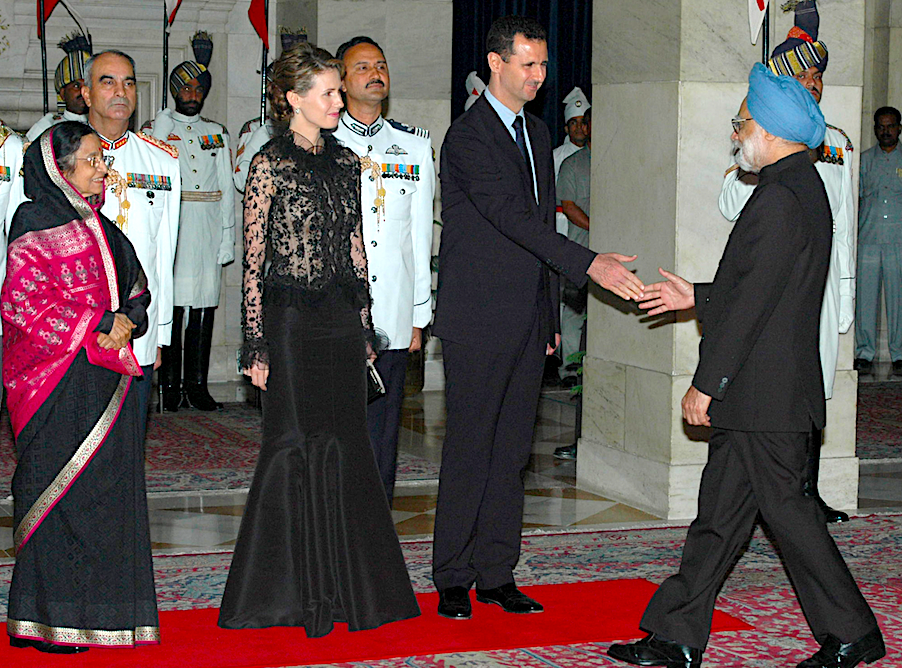
Syrian President Bashar al-Assad and his wife Asma with then-Indian Prime Minister Manmohan Singh and the President Pratibha Patil in New Delhi, 2008. (GODL-India, Wikimedia Commons)
Some 400,000 messages in “Syria Files” are in Arabic , and nearly 70,000 others are in Russian. The documents span the period from August 2006 to March 2012, by which date the Assad government was a year into its war with Western and Gulf-armed jihadist militias masquerading as “moderate rebels.”
A computer-hacking group split off from Anonymous calling itself LulzSec took credit for breaking into the government’s servers, downloading the immense inventory of documents, and conveying them to WikiLeaks.
According to last month’s superseding indictment against Assange and a 2014 article in Rolling Stone magazine, the release took place with the knowledge of the FBI during an apparent sting operation against Assange.
“The range of information extends from the intimate correspondence of the most senior figures in the governing Ba’ath party to records of financial transfers sent from Syrian ministries to other nations,” Sarah Harrison, a longtime WikiLeaks associate, said at a London press conference announcing publication of “Syria Files.”
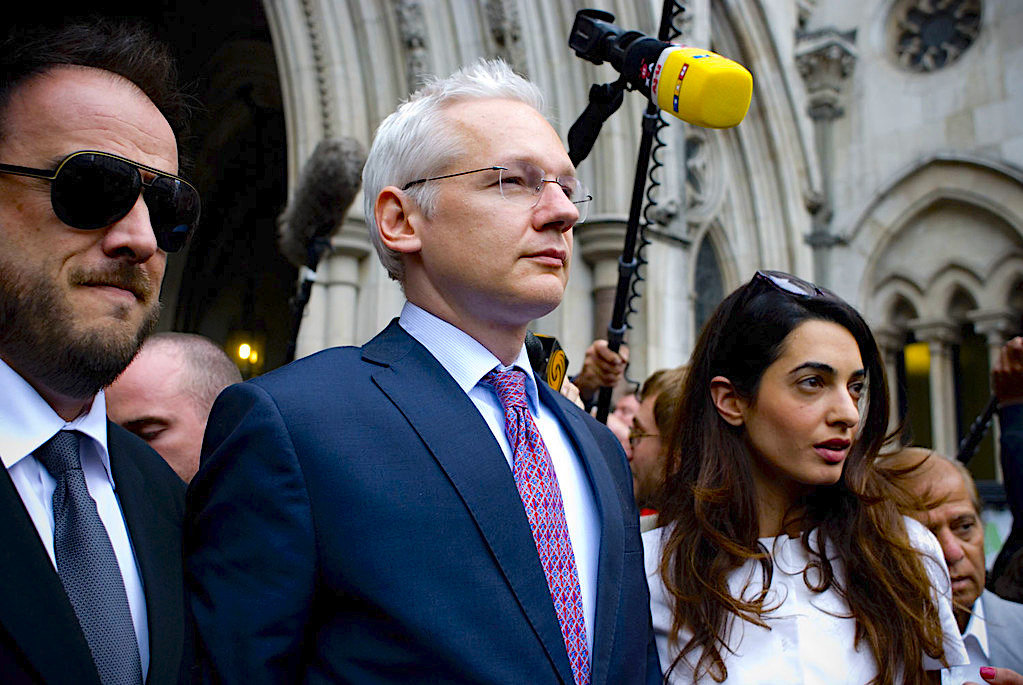
Julian Assange outside UK Supreme Court in 2011. (Flickr)
She quoted Assange, then taking asylum in Ecuador’s London embassy, as saying the publication “helps us not merely to criticize one group or another, but to understand their interests, actions, and thoughts. It is only through understanding this conflict that we can hope to resolve it.” Assange also said the “Syria Files” documents casts light on “how the West and Western companies say one thing and do another.”
As is its customary practice, WikiLeaks divided “Syria Files” into categories. It indexed the email and classified traffic by date of document and date of release. These entry points are not currently operative, however. The navigation tool it provided, found on the “Syria Files” home page, consists of a search mechanism operated by inserting key words or phrases. This is effectively the front door to the inventory of email comprising the publication.
A typical entry , located using the search term “military,” is dated August 14, 2010, and concerns Syria’s financial support for a study of the Golan Heights question developed by the American–Arab Antidiscrimination Committee in Washington. The ADC, founded by James Abourezk, a former U.S. senator of Arabic descent, identifies itself as “a civil-rights organization” and “the largest Arab–American grassroots organization in the U.S.” Official Syrian support for the Golan report had not previously been disclosed.
The emailed note was from the Ministry of Presidential Affairs and appears to have been addressed to President Assad. Among the report’s intended recipients were the White House and the State Department. The British email address in the upper right of the document is not identified. The email appears in “Syria Files” as follows:
| 2010-08-14 08:19:26 | Fwd: Report from ADC | b.shaaban@mopa.gov.sy | buthainak1@hotmail.co.uk |
| Fwd: Report from ADC Your Excellency: RAMADAN KARIM! As you will remember, I had previously mentioned to you that I am sponsoring the costs of researching and printing a report on the Golan Heights to be done by ADC of Washington DC (American-Arab Antidiscrimination Committee) and sent you on April 19th a copy of their preliminary proposal. The report will be sent to: · White House · State Department · Congress · U.S. and International media, Arab-American media · Church groups and Peace and Justice Organizations and Activists · Library of Congress/Congressional Research Service · Middle East Studies Departments at Universities · ADC Members and Chapters and posted on the ADC website. Now they have sent their final draft, enclosed please find same for your perusal. I realize that you personally have very limited spare time, but perhaps you could have one of your expert staff take a careful look and let me know soonest (by latest August 20th as they will start publication on August 25th) if any change |
|||
Also among the significant revelations contained in “Syria Files” are those related to the Damascus government’s business with Western corporations. Email messages dated 2011 and 2012 reveal that Finmeccanica, an Italian manufacturer of aerospace, defense, and security equipment (and now called Leonardo S.p.a.), increased sales of mobile communications gear to Syria a few months after the outbreak of hostilities in March 2011.
The following year it dispatched personnel to train Syrians in the use of Finmeccanica
equipment. Diplomatic traffic WikiLeaks made public in its “Cablegate” releases revealed that the Obama administration had begun covertly supporting anti–Assad militias at the time of the Finmeccanica transactions.
During this same period, Brown Lloyd James, a controversial public relations firm with offices in Washington, New York, London, and Doha (and now known as BLJ), was offering the Assad government advisory services on “perception management”—that is, how to project a sympathetic, reformist image while waging war against insurgent jihadists the U.S. portrayed as “moderate.”
These and other transactions revealed in “Syria Files” indicate that Western companies were doing or seeking business with the Assad government while the U.S. and its allies were beginning their long campaign to depose it — an effort that included a rigorously executed anti–Assad propaganda campaign.
As is WikiLeaks’ customary practice, it worked with various news organizations to disseminate “Syria Files.” For this release, these outlets were Al–Masry Al–Youm, an Egyptian daily newspaper; Al–Akhbar, a Lebanese daily; L’Espresso, the Italian newsweekly; Norddeutscher Rundfunk, Germany’s public broadcaster; OWNI, a French news website, and Público.es, a Spanish news site.
When announcing its partner relationships for “Syria Files,” WikiLeaks initially included The Associated Press among them; it subsequently announced that it had no advance agreement with The AP. No major American media were therefore partnered for the “Syria Files” release.
In a story dated July 8, 2012, two days after “Syria Files” was published, Al– Akhbar confirmed that the emails released were genuine and the identities of those named in them accurate. Translating from Arabic, Wikipedia quotes the Lebanese paper saying the documents “illuminate—often in small ways—the nature of power within and the inner workings of certain political and economic elements in Syria.” The link to this story no longer functions.
Ignored by Media
Coverage of “Syria Files” in the Western press was sparse in comparison with earlier WikiLeaks releases, reflecting the media’s newly critical views of WikiLeaks and its founder. Those outlets covering the Syria release reported it in muted tones and without much detail.
The BBC noted simply, “Some stories which have already appeared seem to concern communications between Syrian representatives and Western suppliers of equipment that could be used for military purposes.” The Daily Telegraph focused on the revelations concerning Finmeccanica, Brown Lloyd James, and other Western companies.
One exception among American media was The Daily Dot, a liberal news website founded in Austin, Texas, in 2011. In September 2016, it reported that WikiLeaks excluded email indicating the Syrian central bank transferred more than a €2 billion to VTB Bank, a Russian institution. The Daily Dot cited U.S. court documents it obtained “through an anonymous source.” The news site did not provide a link to the email in question; nor did it state the date it was written.
The Daily Dot’s implication was that WikiLeaks intentionally kept the relevant messages out of “Syria Files” because they concerned two nations the U.S. considers adversaries.
“One set of emails in particular didn’t make it into the cache published by WikiLeaks in July 2012 as ‘The Syria Files,’” the news site reported, “despite the fact that the hackers themselves were ecstatic at their discovery.” As this statement indicates, The Daily Dot’s case rested on innuendo and the flawed assumption that WikiLeaks had obtained the email in question.
While it is true “Syria Files” did not include the email cited, The Daily Dot neglected to note that WikiLeaks never claimed “Syria Files” included all emails sent and received between the dates the publication covered.
WikiLeaks said in response that The Daily Dot’s story “is speculation and is false.” A spokesperson added,
“The release includes many emails referencing Syrian–Russian relations. As a matter of longstanding policy we do not comment on claimed sources. It is disappointing to see Daily Dot pushing the Hillary Clinton campaign’s neo–McCarthyist conspiracy theories about critical media.”
The Daily Beast appears to have been the only publication to report The Daily Dot’s article. But the piece stands as exemplary of the unbalanced coverage of WikiLeaks and its publications that was by this time prevalent in U.S. and many other Western media.
Patrick Lawrence, a correspondent abroad for many years, chiefly for the International Herald Tribune, is a columnist, essayist, author and lecturer. His most recent book is “Time No Longer: Americans After the American Century” (Yale). Follow him on Twitter @thefloutist.His web site is Patrick Lawrence. Support his work via his Patreon site.
The views expressed are solely those of the author and may or may not reflect those of Consortium News.
Please Contribute to Consortium
News on its 25th Anniversary
Donate securely with  PayPal here.
PayPal here.
Or securely by credit card or check by clicking the red button:

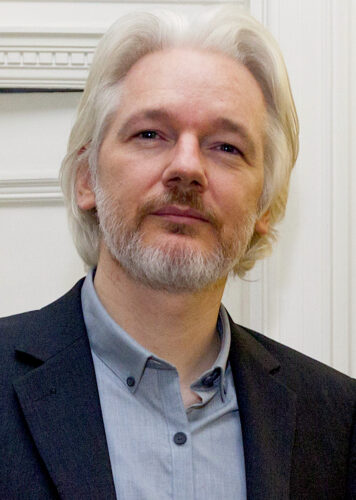
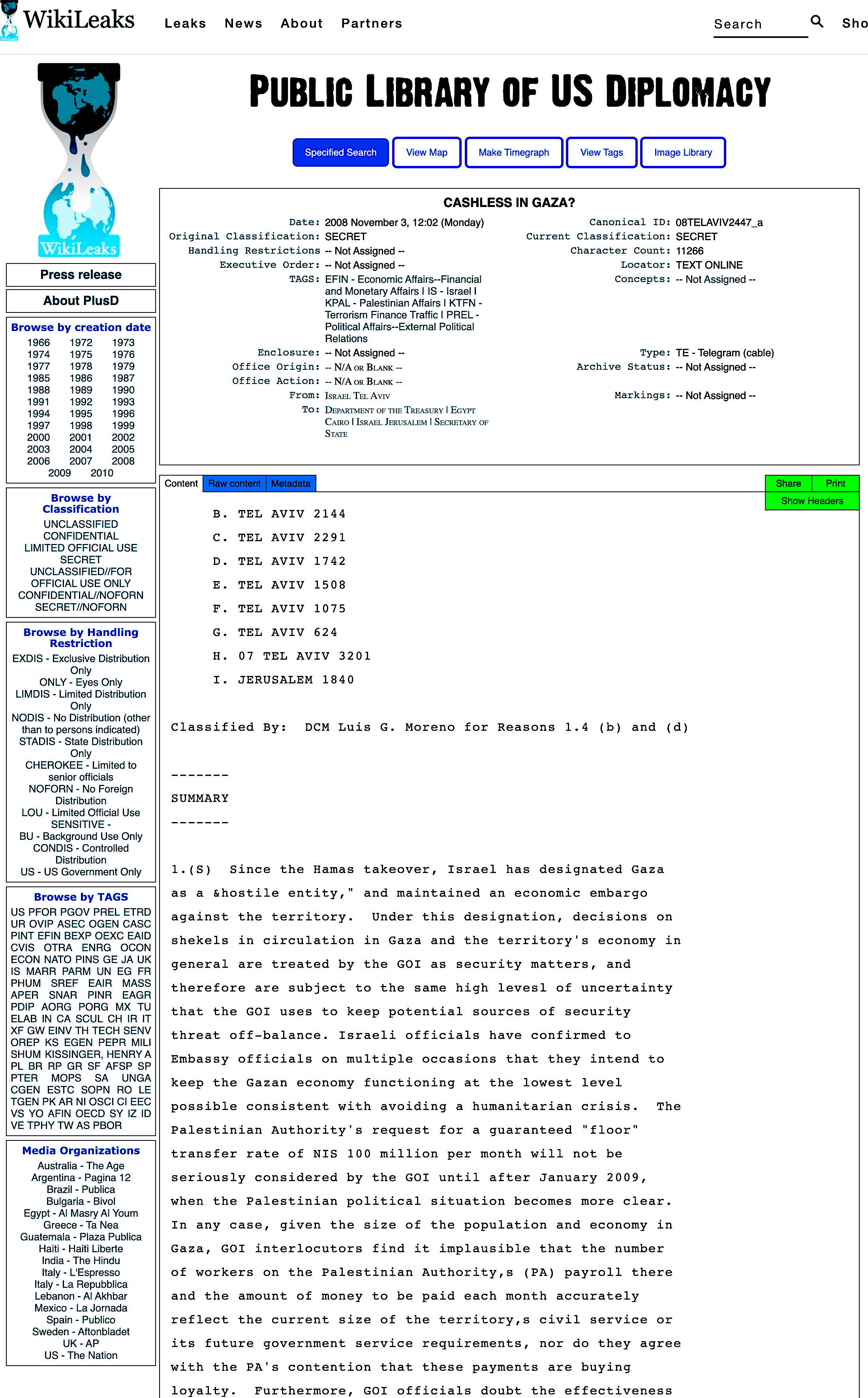
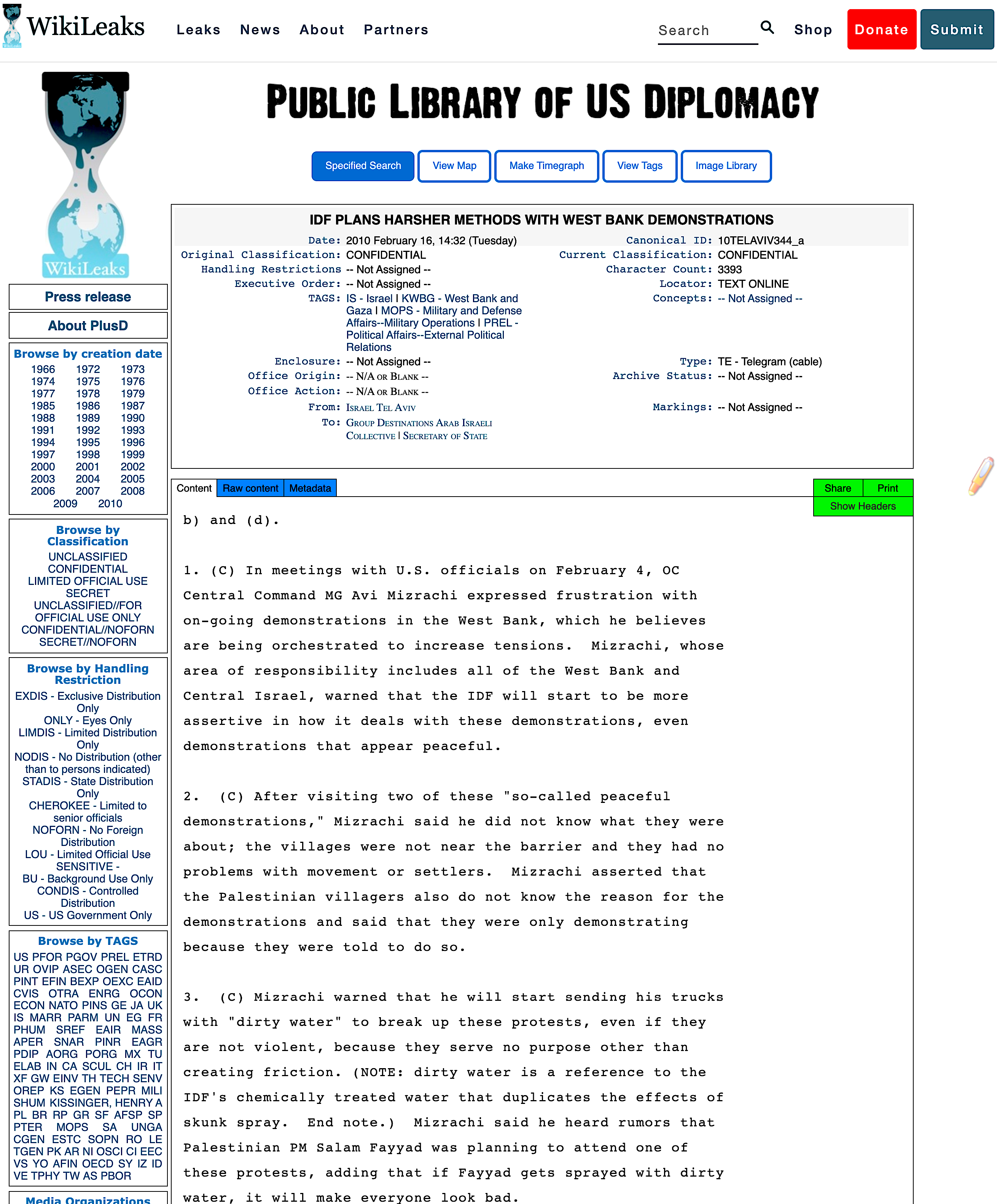
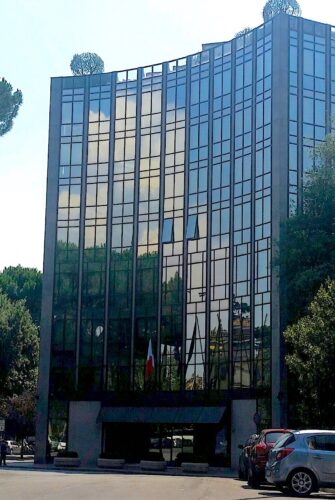
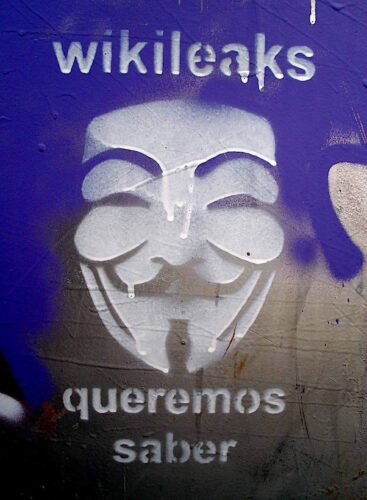
Julian Assange is a Great American.
Ironic but True.
Re: Patrick Lawrence
Thanks to you and Consortium News for continuing to honor the tradition and legacy of Robert Parry with this informed chapter “THE REVELATIONS OF WIKILEAKS: No. 8—Busting the Myth WikiLeaks Published Nothing on Israel & Syria”.
The unconscionable horror that Julian Assange has been forced to suffer the last several years by the intentional, illegal, and immoral actions of the U.S., Great Britain, and their allied governments, beyond being a crime against humanity, is a concerted effort to subvert press freedoms to prevent the dissemination of information to the public that portrays actions being undertaken by the governments that ostensibly represent their interests. The vast majority of all corporate and private media have devolved into mere stenographers parroting the propaganda and daily “Breaking News” headlines being hourly fed to their teleprompters.
We must free Julian Assange, and make it possible for him to tell his TRUTH to the world.
As Usual,
EA
It is intuitively obvious to the most casual of observers that the US is at war with countries which it does not like for its own geopolitical reasons. This is the epitome of political illegitimacy. How many Americans realized they were declaring war on the rest of the planet when they agreed to AUMF?
Even if the public knew what was happening, nothing would change. We are all resigned to our fates and varying degrees of injustice both in our own lives and any quantity of others. This is not a real “home of the brave” – that’s just an inspirational military slogan.
I’d also like to point out that the America has not just declared war on everyone else – the government has, time and again, effectively done so against any group of civilians that seems to be acting against its best interests.
The reason it doesn’t really appear as an extended cold war is the way it takes action is focused enough that it appears to be targeted against “bad apples” – basically, just a reductio ad absurdum of individuals that show signs of disagreement into the “mentally ill” that those who are not capable of handling cognitive dissonance consciously view as some sort of less literal zombie plague, and perhaps unconsciously recognize for the convenient scapegoats that they are.
“Oh, dream maker, you heart breaker
Wherever you’re goin’, I’m goin’ your way” – Moon River
It’s a surreal state of affairs, that we’ve become so enamored with Israel, that not only are they our ally, our support for them is now UNCONDITIONAL!! Seems like this is the stuff of Netanyahu’s dreams, we will follow him to Syria or any place in the world because…I don’t know why, but it’s the best way to help Israel, nothing else matters I guess. Israel needs help with something? You got it, we’re like Chris Hayes man, we’re ALL IN!
Thank you, Mr. Lawrence, for this great reporting. If one were to “ speculate “ upon the reason that Syria transferred 2 billion euros to a Russian bank, the first thing I would consider is the possibility that the Syrian government was trying to keep it away from the effective control of the “international community “, which consists, as Noam Chomsky has so succinctly stated, of the US government and any other government that agrees with it. Venezuela’s Government has since discovered, to its great cost, and its citizens, what a fantastic idea that would have been.
No More War